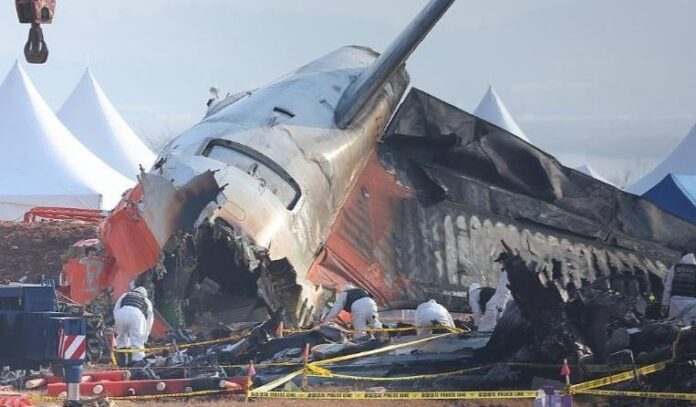Seoul — The flight data and cockpit voice recorders from the Jeju Air crash that killed 179 people failed to capture data in the critical four minutes before the disaster, South Korea’s Ministry of Transport announced Saturday.
The Boeing 737-800, en route from Thailand to Muan, South Korea, on December 29, carried 181 passengers and crew. It belly-landed at Muan airport, collided with a concrete barrier, and erupted into a fireball, marking South Korea’s deadliest aviation disaster to date.
Missing Data Complicates Investigation
“The analysis revealed that both the CVR (Cockpit Voice Recorder) and FDR (Flight Data Recorder) ceased recording during the four minutes preceding the aircraft’s collision with the localiser,” the transport ministry said in a statement.
The localiser, a navigational aid at the runway’s end, was also implicated in intensifying the crash’s impact.
South Korean authorities deemed the flight data recorder too damaged for local recovery and sent it to the U.S. National Transportation Safety Board (NTSB) laboratory for further analysis. However, the data loss from the black boxes has hindered efforts to determine the crash’s exact sequence of events.
“Plans are in place to investigate the cause of the data loss during the ongoing accident investigation,” the ministry added.
Multiple Theories Under Investigation
The crash investigation, led by South Korean and U.S. teams, has pointed to several potential factors, including a bird strike, faulty landing gear, and the runway barrier.
Authorities revealed that the pilot reported a bird strike before aborting an initial landing attempt. On the second attempt, the landing gear failed to deploy, leading to the catastrophic collision.
Lead investigator Lee Seung-yeol disclosed that feathers were found in one of the aircraft’s engines, supporting the bird strike theory. However, he cautioned that such incidents do not typically cause immediate engine failure.
National Mourning and Accountability
The tragedy has triggered a nationwide outpouring of grief, with memorials established across South Korea.
In response, authorities launched raids on Muan airport, a regional aviation office, and Jeju Air’s Seoul headquarters. Jeju Air’s CEO has been barred from leaving the country, while rival political parties have formed a joint task force to probe the incident.
Transport Minister Park Sang-woo offered his resignation earlier this week, citing his responsibility for aviation safety. “I feel a heavy sense of responsibility regarding this tragedy,” Park said.
Continued Commitment to Finding Answers
Despite the setbacks caused by the missing black box data, investigators remain determined to uncover the cause of the crash.
“The investigation will rely on examining and analyzing various data sources. We are committed to determining the cause of this tragedy with the utmost accuracy,” the ministry stated.
As the investigation continues, the disaster serves as a somber reminder of the critical importance of aviation safety and the far-reaching impact of such tragedies.



